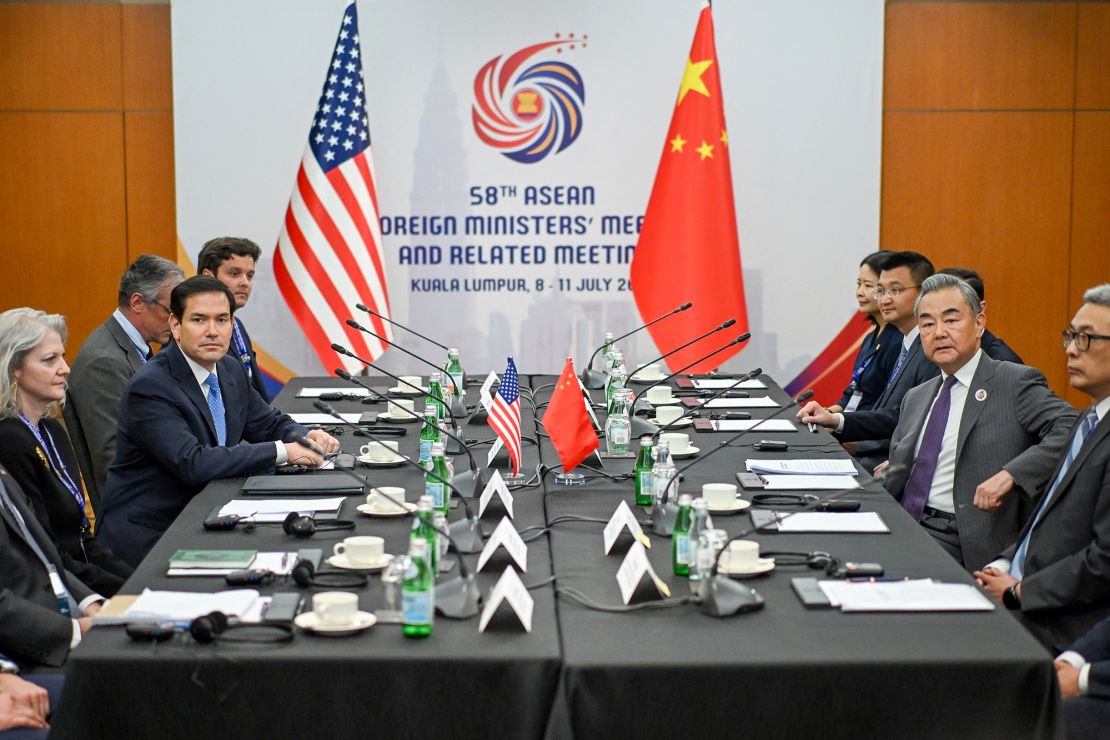CNN
—
There is a “high probability” that US President Donald Trump and Chinese leader Xi Jinping will meet this year, US Secretary of State Marco Rubio said Friday.
“The odds are high,” Rubio told journalists gathered in Kuala Lumpur, Malaysia on Friday. “I think both sides want to see it happen.”
Rubio said he was unable to provide a date for any potential meeting but said there was a “strong desire on both sides to do it.”
The US top diplomat met his Chinese counterpart Wang Yi in Kuala Lumpur on Friday for the first in-person meeting between the two foreign ministers, which comes as the US and China navigate trade frictions – and compete for influence in Asia.
The roughly hour-long meeting was “very constructive” and “positive,” Rubio said on Friday evening local time.
“We’re two big, powerful countries, and there are always going to be issues that we disagree on,” Rubio said, adding “I thought it was (a) very constructive, positive meeting, and (there’s) a lot of work to do.”
Both Rubio and Wang were attending regional meetings in the Malaysian capital this week, where foreign ministers from the Association of Southeast Asian Nations, or ASEAN, gathered alongside regional partners including Russia, Japan, South Korea and Australia.
The US and China have endured fraught trade relations since Trump’s return to office earlier this year, escalating and then de-escalating a tit-for-tat tariff spat sparked by the US president’s global trade war and sparring over export controls.
Tensions were eased as the two sides agreed to a trade framework during talks between negotiators in London last month, and US Treasury Secretary Scott Bessent said earlier this week he would meet with Chinese counterparts to continue discussions in the coming weeks. A 90-day pause negotiated between the two sides in May was set to expire in August.
Chinese officials have decried the US tariffs and threatened to retaliate if the US reaches deals with other trade partners at the expense of Chinese interests – a sign that Beijing sees the US as using agreements with other countries as a means to squeeze its economy.
But both sides signaled that the meeting between Wang and Rubio was a productive one with a positive tone – and a step toward expanding cooperation, rather than frictions, between them.
On Friday, Rubio said his meeting with Wang gave the two sides an opportunity to identify areas to work together, but he did not detail areas of possible cooperation.
“That was our message – that (we have) the opportunity here to achieve some strategic stability and identify areas where we can cooperate together on and build better communications and a working trust,” he said.
The Chinese foreign ministry called Friday’s meeting “positive, pragmatic and constructive” in a statement published after Rubio spoke to the media.
Both sides “agreed to strengthen diplomatic channels and communication and dialogue at all levels in all fields,” the statement said. It also said Wang reiterated calls for Washington to view China with an “objective, rational and pragmatic attitude” and treat it in an “equal” manner.

Trump’s trade war has added a layer of complexity to Rubio’s first trip to Asia as Washington’s top diplomat. The US in recent days sent letters to a number of countries announcing the tariff rates they would face in less than a month unless they strike trade deals with the US.
Eight of the 10 countries in ASEAN – along with South Korea and Japan – will face tariffs from the US on August 1, if the implementation deadline holds.
That’s created an opening for Chinese Foreign Minister Wang, who has looked to project a message that China remains a stable economic partner for the region. In meetings with ASEAN counterparts Thursday, Wang said China “always regards” ASEAN as a “priority” for China’s regional diplomacy.
US government officials have positioned Rubio’s trip as part of an effort to show that Washington remains committed to the region, where China is a key economic partner but also has friction with nations like the Philippines over its aggression in the South China Sea.
“In his first trip to Asia as secretary of state, Secretary Rubio is focused on reaffirming the United States’ commitment to advancing a free, open and secure Indo-Pacific region,” Tammy Bruce, the State Department spokeswoman, said in a statement earlier this week.
On Friday, Rubio pushed back on the idea that US tariffs could create an opportunity for China economically in the region, and said Washington is committed to addressing “tremendous trade imbalances” with countries that have accumulated over the past few decades.
“We’re resetting tariff levels with virtually every country in the world,” he told journalists, noting that such imbalances are “unfair to America and American workers.”
Last year, the US notched a $295 billion goods trade deficit with China, according to data from the US Census Bureau.
“I think countries are going to trade with multiple countries. We don’t view this as an opening for anyone. We don’t view it that way. We view it as an opportunity to reset global trade in a way that’s fair for Americans after two or three decades of unfairness,” he said.
CNN’s Anna Cooban and Shawn Deng contributed to this report.


